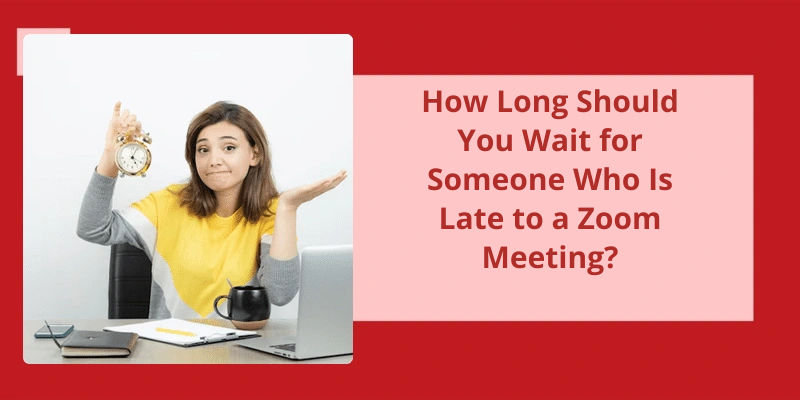In this era of remote work, virtual meetings are an essential part of our daily professional and personal lives. Zoom, the popular video-conferencing platform, has made it easier than ever to connect with colleagues, friends, and family from anywhere in the world. However, as much as we love the convenience of virtual meetings, they come with their own set of challenges. One of the most annoying is when someone is late or doesn't show up at all. It can be frustrating and disruptive, especially when you’ve a packed schedule. But how long should you wait before giving up? Is it different for different types of meetings? The answer is yes. To help you navigate this issue, here's a breakdown of the recommended waiting times: 5 minutes for informative meetings or social calls, 10 minutes when meeting with an equal, and 15 minutes for appointments with superiors or clients.
Is It Rude to Be Late for a Zoom Meeting?
When it comes to virtual meetings, punctuality is just as important as in-person meetings. In fact, some may argue it’s even more critical as there’s no physical presence to indicate youre running late. Showing up late to a Zoom meeting can disrupt the flow of the conversation, reduce engagement and cause frustration to others who’ve made an effort to show up on time.
You risk being seen as disorganized, unreliable, and uncommitted to the task at hand. This can ultimately impact your professional brand and limit your opportunities.
This not only prolongs the meeting but ultimately reduces overall productivity. It’s important to be present from the beginning and stay engaged to avoid missed information.
It shows that you value your own and other peoples time, take your work seriously, and ultimately helps build trust and respect among your colleagues.
It’s understandable to feel frustrated when someone shows up late to a meeting, whether it’s in person or virtual. However, it’s important to approach the situation with a level head and considerate attitude. When it comes to virtual meetings, there are a few simple rules of etiquette to follow when it comes to waiting for someone who’s running late. Let’s delve into these guidelines and explore the reasoning behind them.
How Long Should You Wait When Someone Is Late for a Meeting?
This allows for a buffer in case of technical difficulties or traffic delays, while still respecting everyones time and schedule. That being said, if the late individual communicates their delay beforehand, it’s still important to acknowledge their effort and adjust the schedule accordingly. Being accommodating and understanding can go a long way in building positive relationships and rapport.
However, if someone is consistently late without any prior communication or valid reason, it may be necessary to address the issue directly. This can be done tactfully and respectfully, emphasizing the importance of punctuality and the impact it’s on the group dynamic. It’s possible that the individual may not realize the extent of their lateness or it’s impact on others, and an honest conversation can help clarify expectations and establish clearer communication moving forward.
Ultimately, it’s important to strike a balance between being flexible and accommodating while still maintaining professionalism and respect for everyones time. This may require some trial and error as each group and individual is different, but by maintaining open communication and a collaborative mindset, it’s possible to find a system that works for everyone involved.
Of course, there may be extenuating circumstances that warrant additional grace or understanding, such as emergencies or unexpected interruptions. In these cases, it’s important to approach the situation with empathy and compassion, recognizing that everyone has their own struggles and challenges to navigate. Flexibility and adaptability can be key in these situations, and it may be helpful to have a contingency plan in place to prevent any disruptions from derailing the meeting entirely.
Overall, it’s important to approach late arrivals to meetings with a combination of patience, tact, and respect. By setting clear expectations, communicating openly, and remaining flexible and understanding, it’s possible to create a positive and productive virtual meeting environment where everyone feels valued and heard. And by prioritizing punctuality and mutual respect, we can ensure that we make the most of our time together and achieve our shared goals more effectively.
The Role of Technology in Managing Meeting Schedules and Minimizing Lateness
In today’s digital age, technology plays a vital role in managing meeting schedules, streamlining communication, and reducing delays due to lateness. By using software solutions and communication tools, professionals can schedule meetings, send reminders, and coordinate attendees easily and efficiently, ensuring a smooth and timely meeting. Technology also allows for easier tracking of time, which can help minimize lateness and allow for prompt start times.
It’s important to know the time limitations when using Zoom, especially if you plan on hosting longer meetings or webinars. For those using the basic account, there’s a 40-minute limit on each session, while those with a Zoom Pro account can enjoy unlimited meeting time. Let’s explore some of the other features that come with a Zoom Pro subscription.
Is There a 40 Minute Limit for 1 Person on Zoom?
Zoom has become an essential tool for individuals and businesses in the era of remote work and virtual meetings. As people have been forced to work, study and socialize from their home due to the COVID-19 pandemic, the popularity of Zoom has skyrocketed. However, one question that often comes up is whether there’s a 40 minute limit for one person on Zoom.
The answer to this question is both yes and no. If you’re using Zoom Basic, which is the free version of Zoom, then there’s a time limit of 40 minutes for each session. This means that your individual meeting can’t last longer than 40 minutes before it will automatically end. However, this doesn’t mean you cant start another meeting immediately after.
To avoid interruptions due to the time limit, you can upgrade to Zoom Pro. With Zoom Pro, you get unlimited meeting time, meaning you can have meetings that last as long as you need them to. There are also additional features that come with Zoom Pro, such as the ability to record meetings and access to advanced admin controls.
For example, your internet connection might cause disruptions or delays if it’s not strong enough. Additionally, the number of people in your meeting can impact the quality and stability of the audio and video.
However, it’s important to consider other factors that may impact the quality and duration of your Zoom meetings, such as your internet connection and the number of participants.
How to Prevent Disruptions and Delays During Zoom Meetings
To prevent disruptions and delays during Zoom meetings, ensure that all participants have a stable internet connection, mute microphones when not speaking, and use a headset to minimize background noise. Share an agenda beforehand and have a designated host to manage the meeting and troubleshoot any technical issues. Encourage participants to use the chat function to ask questions or raise concerns, and set ground rules for behavior and participation.
While being late to a meeting may seem like a minor inconvenience, it can actually have a significant impact on how others perceive your professionalism and work ethic. In this article, we will explore the various consequences of being late to a meeting and provide tips for avoiding this common workplace pitfall.
Is It Rude to Be Late to a Meeting?
In the professional world, punctuality is highly valued. When you agree to attend a meeting, whether it’s in person or virtual, it’s expected that you’ll show up on time. However, situations can arise that cause you to be late, and it’s important to handle these instances appropriately. Being late to a meeting can have a negative impact on how others perceive you, and it’s essential to be aware of this.
If youre running late to a meeting, it’s important to let the other attendees know as soon as possible. This shows that you value their time and that you respect their schedules. It’s also a good idea to offer an apology for any inconvenience you may have caused. When you arrive, it’s important to be humble and respectful. Avoid making excuses or blaming others for your lateness.
If youre consistently late to meetings, it can impact your career growth and development. Managers and colleagues may view you as unreliable, and this can harm your chances of being given important projects or promotions. Additionally, it can damage your professional reputation and make it more difficult to work with others in the future.
It’s essential to communicate with others if youre running late and to take responsibility for any inconvenience you may have caused. Consistently being late can have negative consequences for your career, and it’s crucial to prioritize punctuality and reliability in your professional life. By planning ahead and being respectful of others time, you can help ensure that youre viewed as a professional and trustworthy colleague.
Tips for How to Avoid Being Late to a Meeting.
- Set your alarm earlier to ensure you’ve plenty of time to prepare and get to the meeting location.
- Plan your route ahead of time and consider traffic and parking options.
- Prepare any necessary documents or materials the night before to avoid last-minute scrambling.
- Avoid scheduling back-to-back meetings or appointments with tight turnaround times.
- Consider arriving early to the meeting location to allow for unforeseen delays or emergencies.
- Communicate with your colleagues and let them know if you anticipate being late or encountering any delays.
- Be respectful of other people’s time and make punctuality a priority.
When it comes to conference calls, waiting for attendees to join can be a tricky balancing act. On the one hand, you don’t want to waste your time waiting indefinitely, but on the other hand, you don’t want to give up too soon and risk missing important input or feedback. So, how long should you wait before hanging up? According to experts, seven minutes is a reasonable grace period to allow for latecomers. So, if you’re still waiting for someone to join after this time, it’s time to make a decision.
How Long Should You Wait on a Conference Call Before Hanging Up?
During a conference call, it’s common courtesy to wait a reasonable amount of time for all attendees to join in before beginning the discussion. However, with virtual calls, there’s often a higher likelihood for technical difficulties or last-minute schedule changes. This leads to the question, how long should you wait on a conference call before hanging up?
It’s important to note that while 7 minutes is generally considered the acceptable grace period, this timeline may vary depending on the situation. If the call is with a high-level executive or a critical client, it may be more courteous to wait a bit longer. Alternatively, if the call is with a group of colleagues who’re familiar with each others habits, it may be acceptable to cut the wait time short.
If after 7 minutes the attendee hasnt joined, it’s important to make a decision on whether to drop the call or wait a bit longer. If there’s a large group of attendees and the conference is scheduled for a longer duration, it may be acceptable to wait a bit longer. On the other hand, if it’s a small group, and the call is only scheduled for a brief duration, it may be best to drop the call and reschedule.
Ultimately, the key is to balance respect for others time and schedules with the need to keep the conference moving forward. Waiting too long can be frustrating for those who’ve already joined and can cause delays or disruptions to the agenda. Conversely, abruptly ending the call can be seen as rude or inconsiderate. By finding the right balance and following the established guidelines, conference calls can be productive and respectful for all involved.
However, the general rule of thumb of around 7 minutes is a good starting point. The specific wait time may vary depending on the attendees importance, the size of the group, the calls duration, and other factors. By doing so, everyone can have a productive and successful call.
How to Effectively Take Meeting Minutes During a Conference Call
Taking effective meeting minutes during a conference call involves actively listening to the discussion, using clear and concise language to document the key points, and clarifying any uncertainties or questions. It’s important to focus on the main topics and decisions made, rather than trying to capture every detail, and to organize the notes in a logical and easy-to-follow format. Additionally, sharing the minutes with all participants in a timely manner after the call can help ensure that everyone is on the same page and any necessary follow-up actions are taken.
In any business setting, punctuality is essential to ensure that meetings run smoothly and efficiently. However, what happens when one of the participants fails to show up on time? You can’t just start without them, but at what point do you draw the line and assume they’re not coming? In a recent survey, we asked professionals how long they’d wait for someone in a meeting, and the responses were quite varied.
How Long Should You Wait for Someone in a Meeting?
When it comes to meetings, theres always a chance that someone might not show up on time due to unforeseen circumstances. It’s not uncommon to be left waiting, wondering when theyll arrive. But how long should you wait before considering it a no-show? Thats a question that many people ask themselves, and the answer can vary depending on the situation.
In a recent survey conducted by a popular business publication, 48% of the respondents believed that waiting up to 10 minutes was a reasonable time limit before deciding to move on. This is a good guideline to keep in mind when scheduling meetings with tight schedules. This gives ample time for any potential delays while still making efficient use of time.
On the other hand, it’s important to consider that some people may have other priorities or time constraints that could cause them to be late. For instance, employees who work in large organizations might be juggling multiple meetings, which could make it difficult for them to be on time for every single one. In these situations, it might be worth waiting a few extra minutes to give the attendee the benefit of the doubt.
Another factor that can impact how long you wait for someone is the nature of the meeting itself. For example, if the meeting is critical and requires the input of the late participant, waiting for a few extra minutes could be appropriate to avoid derailing the whole meeting. But if the meeting is minor or if the late participants contribution isnt essential, it might be best to move forward without them after a short waiting period.
While it’s important to be punctual and respectful of other peoples time, it’s also good to have some flexibility when necessary. Arriving late or being left waiting can be frustrating, but showing a bit of understanding and patience can go a long way in maintaining good relationships and avoiding unnecessary conflict.
Ultimately, the decision of how long to wait should reflect the specific situation at hand and should be made with mutual interest in mind. Keeping the communication lines open and making any necessary adjustments in advance, can help to prevent tardiness, and thereby unnecessary waiting.
Source: For work, how long do you wait for if the person you’re …






